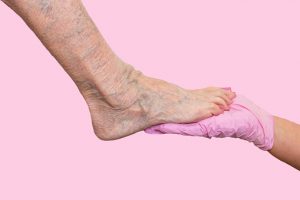 Varicose veins are swollen and twisted veins that could be linked to a higher risk of developing deep venous thrombosis. The new research that explored this link claimed that the risk of developing dangerous blood clots increases five times for those suffering from varicose veins.
Varicose veins are swollen and twisted veins that could be linked to a higher risk of developing deep venous thrombosis. The new research that explored this link claimed that the risk of developing dangerous blood clots increases five times for those suffering from varicose veins.
What Is Deep Venous Thrombosis?
Deep venous thrombosis is a condition where clots develop in the veins of legs and travel through these veins up to the heart and lungs. This can cause a serious threat to life as the clot can obstruct blood flow and can cause pulmonary embolisms (clots in the lungs) or lead to the development of peripheral artery disease, a condition where the arteries of the limbs become narrow.
Advertisement
Most often, the symptoms of deep venous thrombosis are unnoticed. The noticeable symptoms include leg pain, skin discoloration, and a warm feeling in the affected leg. However, a new study suggests that varicose veins also have a link to the condition.
The Link between Varicose Veins and Deep Venous Thrombosis
Dr. Shyue-Luen Chang at the Chang Gung Memorial Hospital of Taiwan studied a database of over 425,000 patients who registered for treatment between 2001 and 2013, and came for follow-ups until 2014. He found that patients suffering from varicose veins had a 5.3 times greater risk of developing deep venous thrombosis.
His team also found that patients suffering from varicose veins had higher incidences of pulmonary embolisms and peripheral artery disease.
Shortcomings of the Study
While the study found a definite association between varicose veins, pulmonary embolisms, peripheral artery disease, and deep venous thrombosis, the link between varicose veins, pulmonary embolisms, and peripheral artery disease was not clearly established. Researchers were also unable to explain the causative relation between varicose veins and deep venous thrombosis. It is still unclear why patients suffering from varicose veins are at a higher risk of the condition.
In addition, the database did not contain information of the many people who did not seek treatment. Therefore, researchers could only establish a link between serious cases of varicose veins and deep venous thrombosis.
Importance of the Study
Despite the shortcomings of the study, researchers found a definitive correlation between incidences of deep venous thrombosis and varicose veins. This increased risk observed in patients with varicose veins suggests that it is not a condition to be treated lightly. Therefore, Dr. Chang recommends that patients who develop varicose veins need to carefully monitor and evaluate their condition.
Varicose veins are a very common condition that afflicts around 23 percent of the American adult population. While the condition was never associated with any serious health risk, the findings of this research prove the contrary. Hence, it will change the entire approach towards the importance of timely diagnosis and treatment if the risk of deep venous thrombosis and associated risks are to reduce.
Advertisement
Related:
Varicose veins natural treatment: How to get rid of spider veins naturally
